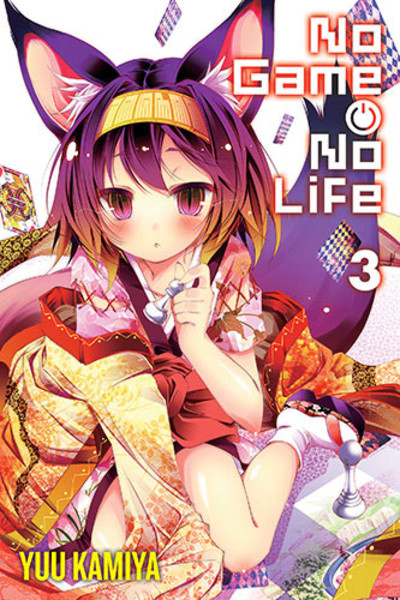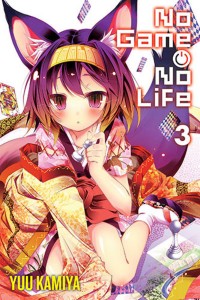By Yuu Kamiya. Released in Japan by Media Factory. Released in North America by Yen On.
The usual caveats apply: there’s lots of skeevy art of underage girls, Sora spends much time discussing how to secretly film naked girls, and the not-quite-incest plot I was desperately hoping would be avoided from now on gets another peek. That said, I imagine anyone for whom those are a deal breaker would not be reading Vol. 3, so let’s move on to discussing Sora and Shiro, our heroes. It was refreshing seeing the start of this book from Shiro’s perspective, particularly as once Sora returned it went back to being mostly him, as he’s the one that talks. Sora and Shiro not only love each other like family (or more in Shiro’s case), but also idolize each other, and they each get narratives at some point bemoaning that they aren’t good at what the other excels in. Sora at one point mocks those who think this series is about the two growing stronger and maturing, as he points out they’re both already perfect.
The amusing thing about this, of course, is that it’s almost immediately undercut by Sora’s own actions, something Jibril cheerfully points out. Like it or not, this world is going to make the two of them change. That said, Sora also has a point – in terms of actual gaming ability, and the narrative need for victory, [ ] are already at the pinnacle. We don’t read this series to see how these two learn how to be better players – if anything, Stephanie fulfills that role in a way, though she’s still used almost entirely as comic relief instead. No, our heroes are already the best, and there is simply no doubt they will win – the question is how. Reading the long action sequence in the middle of the book, where they compete in a virtual shooting game against the Werebeasts, it really is astounding how much of the surprise twists were long thought out in advance by Sora beforehand. The same applies to the Othello game at the start.
Speaking of the Werebeasts, Izuna is the one who gets the most development in this book. Before the game starts Sora asks her whether she’s ever had fun playing a game. Of course the answer is no – with the fate of her entire nation always on her shoulders, this is a heavy burden. Plus she always wins, so it’s a boring heavy burden. But after her loss, she quickly realizes how exciting it is to be able to play someone who can kick her ass, giving her something to strive for. As for the fate of her people, what was somewhat clear in the first two books is made more explicit – the main plot seems to be Sora and Shiro uniting all of the 16 species into one nation, and the main difficulty is convincing everyone that they aren’t actually evil.
I’ve mentioned the books main flaws above, but as I hinted before, I really wish the author would do more with Stephanie – we’ve seen flashes of how smart she can actually be when she’s not dealing with Sora and Shiro or being humiliated, and I long to see more. Sadly, the fourth novel looks like a fluffy beach story, so I suspect I won’t get it. Other than that, the humor I liked in the first two books is still there, with lots of popular gaming references. There’s also some vivid horror as well with Sora’s fate towards the start of the book, and later Chlammy’s as well. There’s a fascinating series here beneath all the ecchi posturing and naked fanservice.

